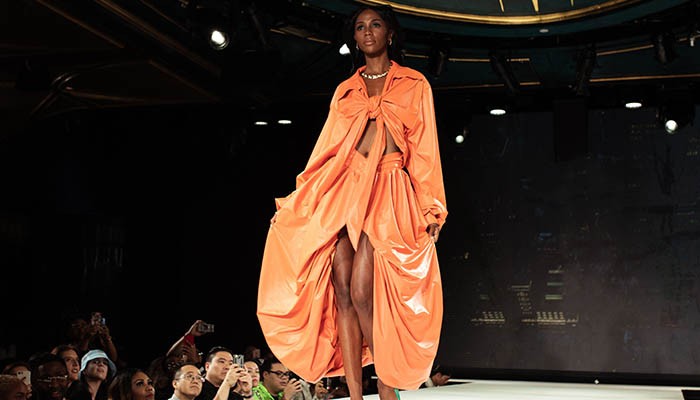
The Nigerian fashion industry is a vibrant and dynamic platform that showcases the country's rich cultural heritage while nurturing creativity and self-expression. It goes beyond mere clothing; it serves as a canvas for designers to intertwine tradition and innovation, creating unique styles that reflect the diversity of Nigerian culture.
In this article, we will explore how Nigerian fashion is a powerful medium for cultural expression and examine the industry's role in fostering creativity and pushing boundaries.
Historical Background of Nigerian Fashion
Nigeria's fashion industry has a fascinating historical background that showcases the country's rich cultural heritage. Traditional clothing, such as the majestic agbada and the intricately tied gele, represents the diverse ethnic groups and their unique identities.
However, the influence of colonialism cannot be overlooked. Western fashion styles infiltrated Nigeria, leading to a fusion of traditional and European elements. Despite this, Nigerian designers began to emerge, infusing their creations with cultural pride and authenticity.
Fashion shows became pivotal in highlighting their talent and propelling the industry's growth. In this section, we will explore the historical context of Nigerian fashion, from its traditional roots to the emergence of contemporary designers and fashion shows.
Cultural Influences in Nigerian Fashion
Nigerian fashion draws inspiration from the rich tapestry of cultural influences that shape the nation. With over 250 ethnic groups, each possessing unique traditions and aesthetics, the diversity is immense.
From the flamboyant Yoruba attire to the graceful Hausa garments, these cultural groups have left an indelible mark on Nigerian fashion. Contemporary designers skillfully incorporate traditional fabrics, prints, and motifs into their creations, breathing new life into age-old traditions.
Moreover, traditional attire holds a deep significance in Nigerian ceremonies and celebrations, symbolizing heritage, status, and identity.
Nigerian Fashion Designers
Nigeria is home to a plethora of talented fashion designers who have made significant contributions to the industry both locally and globally. One such influential figure is Deola Sagoe, known for her exquisite use of African fabrics and intricate craftsmanship. She has played a pivotal role in promoting Nigerian fashion on the international stage.
Another prominent designer is Mai Atafo, celebrated for his modern take on traditional Nigerian attire, creating a perfect blend of contemporary and cultural elements. These designers, along with others like Lisa Folawiyo and Tiffany Amber, have crafted their unique design aesthetics, showcasing a fusion of bold colors, intricate patterns, and innovative silhouettes. Their creations celebrate Nigerian culture and resonate with fashion enthusiasts worldwide. Nigerian fashion designers have garnered global recognition, as evidenced by their works being featured on international runways and worn by celebrities.
Their impact goes beyond fashion, promoting cultural exchange, and highlighting Nigeria's creative talent. In this section, we delve into the profiles of influential Nigerian fashion designers, explore their design aesthetics, and recognize their significant contributions to the global fashion landscape.
Nigerian Fashion Industry's Economic Impact
The Nigerian fashion industry has experienced remarkable growth and development in recent years, making significant contributions to the country's economy. With a thriving domestic market and increasing international recognition, the industry has become a major driver of economic activity.
Notably, the fashion industry has played a vital role in job creation, providing employment opportunities for designers, tailors, artisans, models, and various supporting roles. Moreover, it has fueled entrepreneurship, encouraging young designers to establish their own brands and contribute to the industry's expansion.
Beyond job creation, the Nigerian fashion industry holds immense potential for economic growth through exports and tourism. Nigerian designers have gained global acclaim, with their unique and culturally-inspired creations captivating international audiences.
This recognition opens doors for exporting Nigerian fashion products and textiles, generating revenue and boosting the country's export sector. Additionally, the popularity of Nigerian fashion has become a draw for tourists seeking an authentic cultural experience, leading to increased tourism revenues and further stimulating the economy.
Fashion Weeks and Events
Fashion weeks and events in Nigeria, notably the renowned Lagos Fashion Week, hold immense significance for the Nigerian and global fashion industries. These events serve as platforms for designers to showcase their creativity, pushing boundaries and setting new trends.
Lagos Fashion Week, in particular, has become a melting pot of talent, bringing together established and emerging designers, models, stylists, and fashion enthusiasts. It provides a spotlight for Nigerian designers to display their craftsmanship, innovation, and unique design perspectives.
Fashion weeks in Nigeria also play a pivotal role in attracting international attention. With the presence of esteemed guests, industry professionals, and media from around the world, these events serve as a gateway for Nigerian designers to gain global recognition.
The exposure garnered from these platforms not only promotes individual designers but also shines a spotlight on the vibrancy and diversity of Nigerian fashion as a whole.
#WassupNaija
Written by Ola Abiodun, a copywriter with ten years of experience, he is passionate about technology and has assisted hundreds of businesses by using his copy to turn visitors into paying clients.